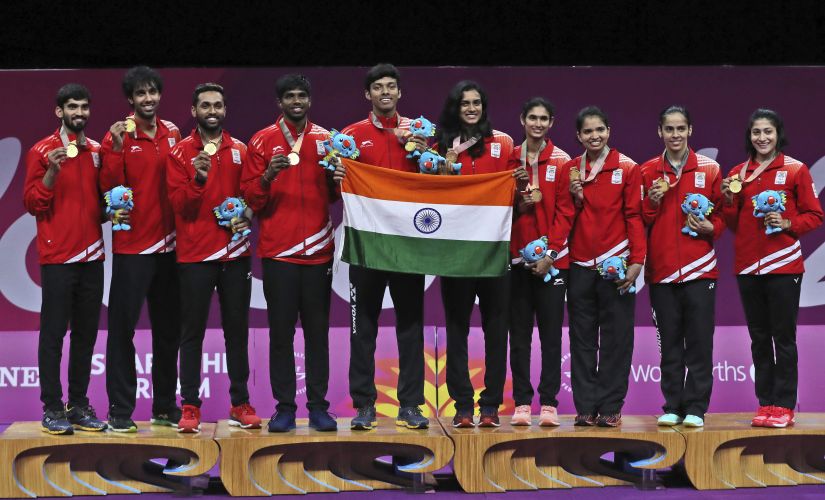It was an unprecedented and unforgettable sight that will forever be stamped on the memory cells of all who were privileged to see it live, even on television — a mixed Indian badminton team, astride the topmost rung of the Commonwealth Games (CWG) winners’ rostrum, admiring the glittering, yellow-coloured medals they had earned by dint of their consistently strong and self-confident performances over the preceding five days.
As the Indian tricolor rose slowly and gracefully to the strains of the country’s national anthem, to the highest point below the roof of the Carrara Sports and Leisure Centre on Australia’s Gold Coast, the likes of Saina Nehwal and Kidambi Srikanth looked moist-eyed upwards, trying to soak in the fact that they had just pooled their talents to win for India the country’s first ever gold medal in an international badminton team event.
No praise can be too high for their momentous achievement, although admittedly, the opposition at the CWG is comparatively tepid in the absence of several of the sport’s top guns who are not members of the British Commonwealth, and India had been proclaimed as the strongest team in the competition, with the Badminton World Federation (BWF) giving them top billing.

The triumph must really be viewed in proper historical perspective, in that India has never before been considered a badminton team heavyweight. Nor has it ever before possessed such a powerful, well-balanced team. The fact remains that the best an Indian squad has achieved in its efforts in the badminton arena at earlier editions of the Games has been a silver medal showing in the 2010 version on home ground in New Delhi.
On that occasion, the Indians had gone down in the final to Malaysia, who had won the title in the 2006 edition of the quadrennial Games as well, and were to go on to win in 2014 at Glasgow, to complete a unique hat-trick of triumphs in this mixed team event that is run along the lines of the Sudirman Cup. In other words, needing all-round strength in all five disciplines of the sport – the two singles and three doubles.
India had also stumbled in Glasgow, four years back, while conceding the bronze medal play-off to Singapore by a narrow 2-3 margin. Pullela Gopichand’s crack side, on this occasion, gained sweet revenge for that reverse by beating the Singaporeans by a 3-1 scoreline in the semi-finals on Saturday, although the bland scoreline does not tell the true tale of just how much the Indians were made to sweat for their win.
The one match that India conceded this time was the men’s doubles, after the youthful pair of Satwiksairaj Rankireddy and Chirag Shetty came within just two points of victory in the second game against Danny Bawa Chrisnanta and Terry Hee, after bagging the first, but could not close it out, and were totally outmanoeuvred in the decider. But Srikanth and Nehwal had given their side a good cushion, and the tight mixed doubles triumph from Rankireddy and Ashwini Ponnappa sealed the deal.
The Indian victory in the final against Malaysia on Sunday evening by the identical scoreline of 3-1, would have been doubly satisfying, for it was not only achieved against the nation that had deprived the Indians of the gold in New Delhi eight years ago, but it was also earned through male spearhead Srikanth’s first-ever win against the redoubtable Lee Chong Wei, who has totally dominated international badminton in the company of China’s Lin Dan over the past dozen years.
The team management must have agonized long and hard over fielding Srikanth — whose recent form has been nothing to speak about, and who had lost all his four previous matches against the 35-year-old Malaysian ace — in preference to his lower-ranked team-mate, HS Prannoy, who has a 2-2 career head-to-head record against Lee, and who had significantly won on the most recent two occasions that the two clashed, in the Indonesian Open in June and the Danish Open in October, both last year.
But, as has been often said, form may be temporary, but class is permanent. With India opting to place its faith in Srikanth’s pedigree, the 25-year-old Andhra native lifted his game to dizzy heights against the three-time Olympic silver medallist, just when it mattered the most. Srikanth was positive and aggressive, showed no signs of the foot injury that had blighted his efforts on court in the initial weeks of the current year, and was able to hit his sizzling overhead jump smashes both along the sideline and across court, at will.
It certainly helped that Lee has most definitely slowed down, and was just that little bit late in clearing the bird from the net — which gave the Indian that split-second extra time to execute the leaping overhead smash, hit with excellent variations of pace and angle. Lee was never in the match, and Srikanth was full value for his 21-17, 21-14 success — which, coincidentally, was exactly the same scoreline in the semi-final against Singaporean Loh Kean Yew.
Srikanth’s victory virtually broke Malaysian hearts, since it was crucial for the defending champions that Lee wins his match, and bring his team back on par in the summit clash with the Indians, who had earlier bagged the mixed doubles. Putting the massive burden of having to play two matches on the 17-year-old shoulders of Rankireddy, the Indian team management had once again sent him onto court with the experienced 28-year-old Ponnappa, to take on the strong Malaysian combination of Chan Peng Soon and Goh Liu Yong, seeded second in the individual event.
A hard-fought 21-14, 15-21, 21-15 win had allowed the Indians to make a dream start to the final; and the value of this win in the eventual result must not be under-estimated. Had Rankireddy and Ponnappa lost, a vast amount of pressure would have come on Srikanth, and the tie could well have gone down to the wire, instead of finishing with the penultimate encounter.
The lion’s share of the credit for the mixed doubles victory must go to Ponnappa, who served well, was outstanding at the net, and created a vast number of openings for her hard-hitting partner to finish off. The girl from Coorg had also shone in the semi-final against Singapore; and must now be considered a fine prospect for a mixed doubles individual medal.
After Srikanth had sent the Indians to the brink of a gold medal triumph, there was a temporary letdown for the Indians when Rankireddy and Shetty could not get past Goh V. Shem and Tan Wee Kiong, who have been ranked as high as World No 2 in the past. The Malaysians took the Indians down by a 21-15, 22-20 margin, to give their team a whiff of producing an improbable renaissance.
That was all snuffed out by the Queen of Indian badminton, Nehwal, who was called upon to play her sixth match in five days for the country in this mixed team event, ostensibly to give the injured ankle of her heir-apparent, PV Sindhu, a little more time to recover. Nehwal looked careworn and weary for the most part, and was at far from her best, as Soniaa Cheah, ranked 29th in the world, dragged her all over the court and stayed obdurately in the long rallies.
But the old war-horse would not be denied when it mattered the most. From a 9-11 deficit at the mid-point of the first game, the former World No 1 reeled off a dozen points without reply, to bag the first game. She was a bit untidy in the second game, to allow her rival to bag it at 21-19, but pulled up her socks in no uncertain manner in the decider, to record a 21-11, 19-21, 21-9 triumph. Those famed fighting qualities were never in evidence more than in that final game.
And so, the mixed badminton team completed a never-to-be-forgotten day for Indian sport, as it emulated the sterling efforts of the two table tennis squads, and made it gold, gold, gold all the way.


No comments:
Post a Comment